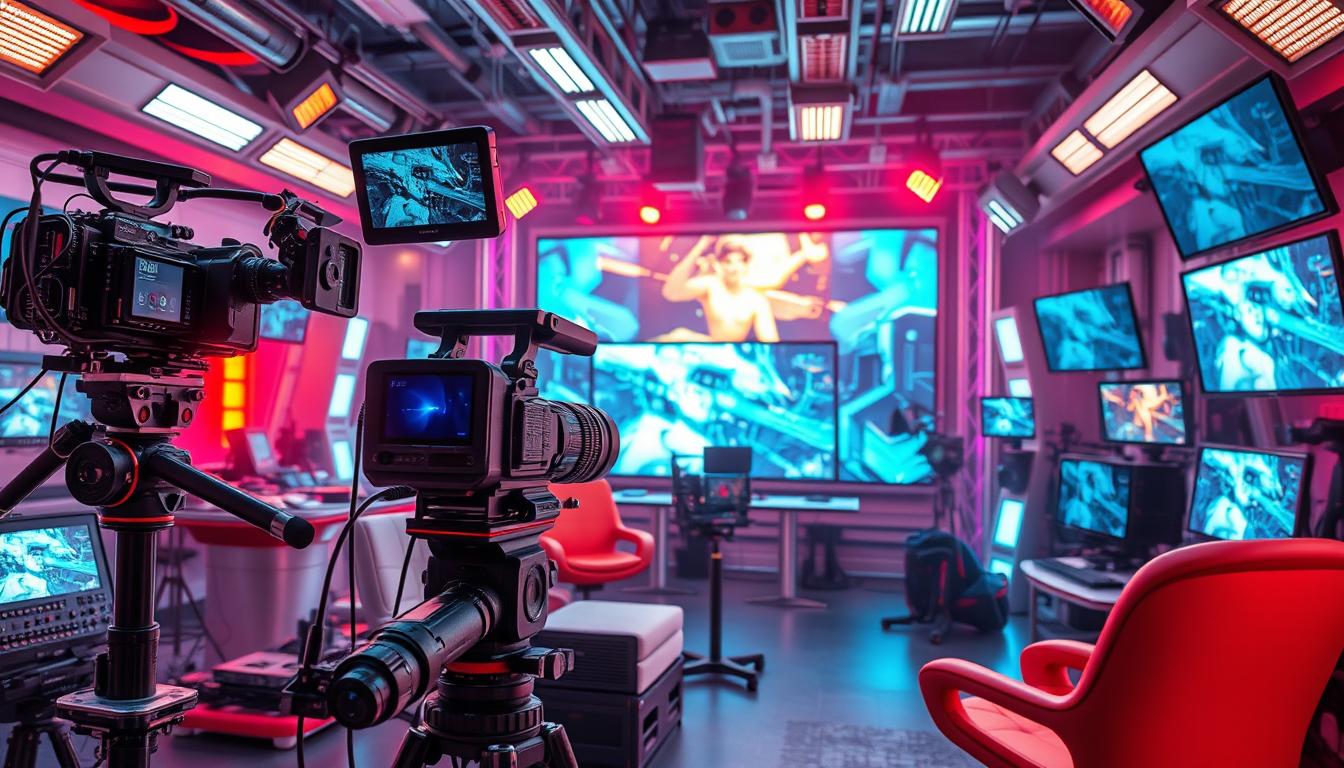AI is revolutionizing filmmaking in exciting ways. This guide explores AI-driven storytelling, character development, and visual effects. We’ll reveal cutting-edge techniques that elevate cinematic experiences to new heights.
Learn how to use AI to transform your filmmaking vision. Discover tools that push the boundaries of moviemaking art. Harness AI’s potential to create truly innovative and captivating films.
Key Takeaways
- Explore the transformative potential of AI in filmmaking, from AI-powered storytelling to AI-assisted visual effects.
- Uncover innovative AI tools and techniques that can elevate your cinematic vision and revolutionize the moviemaking process.
- Discover how to leverage AI for character development, scriptwriting, storyboarding, and seamless integration of AI-powered VFX.
- Understand the ethical considerations and collaborative approaches in AI-driven filmmaking.
- Dive into case studies of groundbreaking AI-powered films and explore the future of AI in the film industry.
Unleashing the Power of AI in Filmmaking
AI is revolutionizing filmmaking. It enhances storytelling and provides innovative cinematic tools. The film industry is embracing AI to elevate creativity.
Exploring the Potential of AI-Driven Narrative Development
AI-driven narrative development is reshaping storytelling in film. It empowers filmmakers to craft compelling tales. AI algorithms help with character development, plot structures, and emotional arcs.
This blend of human creativity and AI intelligence creates innovative cinematic experiences. It paves the way for thought-provoking films that captivate audiences.
Innovative AI Tools for Cinematic Visualization
The film industry now uses cutting-edge AI visualization tools. These technologies bring creative visions to life with precision and efficiency. Filmmakers can experiment and refine ideas with remarkable agility.
AI-assisted storyboarding and AI-powered cinematography enhance the overall cinematic experience. These tools allow for rapid prototyping and improved visual storytelling.
| AI-Powered Filmmaking Tools | Key Features |
|---|---|
| AI-Assisted Storyboarding | Automatically generates storyboard frames based on screenplay, allowing for rapid prototyping and visualization |
| AI-Driven Cinematography | Analyzes script and footage to recommend optimal camera angles, shot compositions, and lighting for enhanced cinematic aesthetics |
| AI Visualization Platforms | Provide filmmakers with interactive tools to experiment with virtual sets, characters, and special effects before production |
AI-powered storytelling and cinematic tools are reshaping the film industry. They empower filmmakers to push creative boundaries. The future of cinema lies in human-AI collaboration.
“AI is not here to replace human creativity, but to enhance and amplify it. The future of filmmaking lies in the seamless collaboration between human artistry and AI intelligence.”
How to Create AI-Driven Movie Scenes
AI is transforming filmmaking, offering new ways to create captivating movie scenes. Directors can now use AI to enhance their creative process. From pre-production to post-production, AI streamlines the entire filmmaking workflow.
AI allows filmmakers to generate and manipulate virtual environments with precision. They can experiment with various scenarios without physical production constraints. This frees directors to focus on storytelling and artistic aspects.
AI also enhances post-production work. It can improve visual effects, smooth camera movements, and assist in editing. These AI-powered tools streamline the creative process significantly.
“AI-powered filmmaking techniques are transforming the way we approach cinematic storytelling. The ability to create dynamic, AI-driven movie scenes opens up a world of possibilities for filmmakers to push the boundaries of what’s possible on the silver screen.
AI in filmmaking unlocks new creative avenues for directors and producers. It helps deliver visually stunning and emotionally captivating cinematic experiences. The future of AI-driven movie scene creation is here, offering endless possibilities.
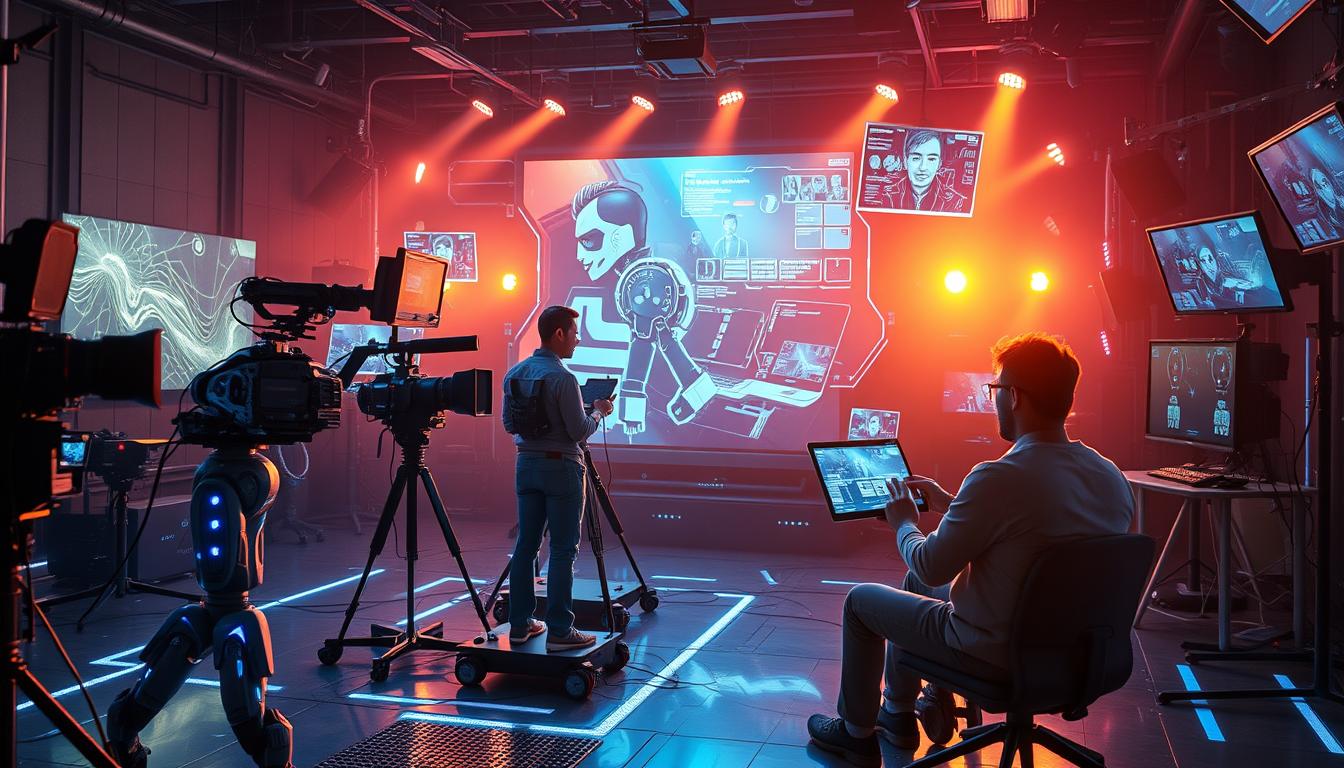
AI-Generated Character Development
AI is changing how filmmakers create characters. AI-generated character creation and AI-powered character design help craft unique personas with distinct traits and backstories. This technology allows for more detailed and interesting characters in films.
AI-driven character backstories open new doors in storytelling. AI can analyze data to create complex character histories. It can also develop personal motivations that bring on-screen personas to life.
AI-assisted narrative development enhances character-driven stories. This tool can spot engaging plot points and character interactions. It helps create narratives that keep audiences hooked throughout the film.
Crafting Compelling Narratives with AI
AI in character-driven storytelling is a game-changer for filmmakers. It can identify captivating narrative arcs and plot points. This technology ensures stories flow smoothly and keep viewers engaged.
- AI-generated character profiles that provide depth and nuance
- Algorithmic analysis of character dynamics and their impact on the story
- AI-assisted plot generation to ensure narrative cohesion and emotional resonance
“AI has unlocked a new frontier in character development, allowing us to create complex, multi-dimensional personalities that truly drive the narrative forward.”
AI helps create visually stunning and emotionally engaging stories. It combines character creation with narrative development. This blend results in films that captivate audiences and leave lasting impressions.
AI-Assisted Scriptwriting and Storyboarding
AI-powered scriptwriting and storyboarding are changing filmmaking. These tools help creators bring stories to life faster and more efficiently. Filmmakers can now explore new narrative possibilities with artificial intelligence.
AI-generated screenplay tools speed up script creation. Writers can quickly explore plot ideas and improve their storytelling. These algorithms analyze narrative patterns and provide valuable suggestions for compelling scripts.
AI benefits extend to pre-production too. AI-driven storyboarding tools help filmmakers visualize scenes with precision. They create detailed storyboards and automate scene planning.
| Feature | AI-Powered Scriptwriting | AI-Driven Storyboarding |
|---|---|---|
| Ideation | Generates script ideas and plot points | Visualizes scenes and sequences |
| Optimization | Refines dialogue, character arcs, and narrative structure | Optimizes camera angles, framing, and shot composition |
| Collaboration | Facilitates feedback and iterative development | Enables seamless integration with virtual production |
AI in scriptwriting and storyboarding opens new creative doors. It streamlines pre-production and helps deliver captivating stories. Filmmakers can now craft more impactful content for their audiences.
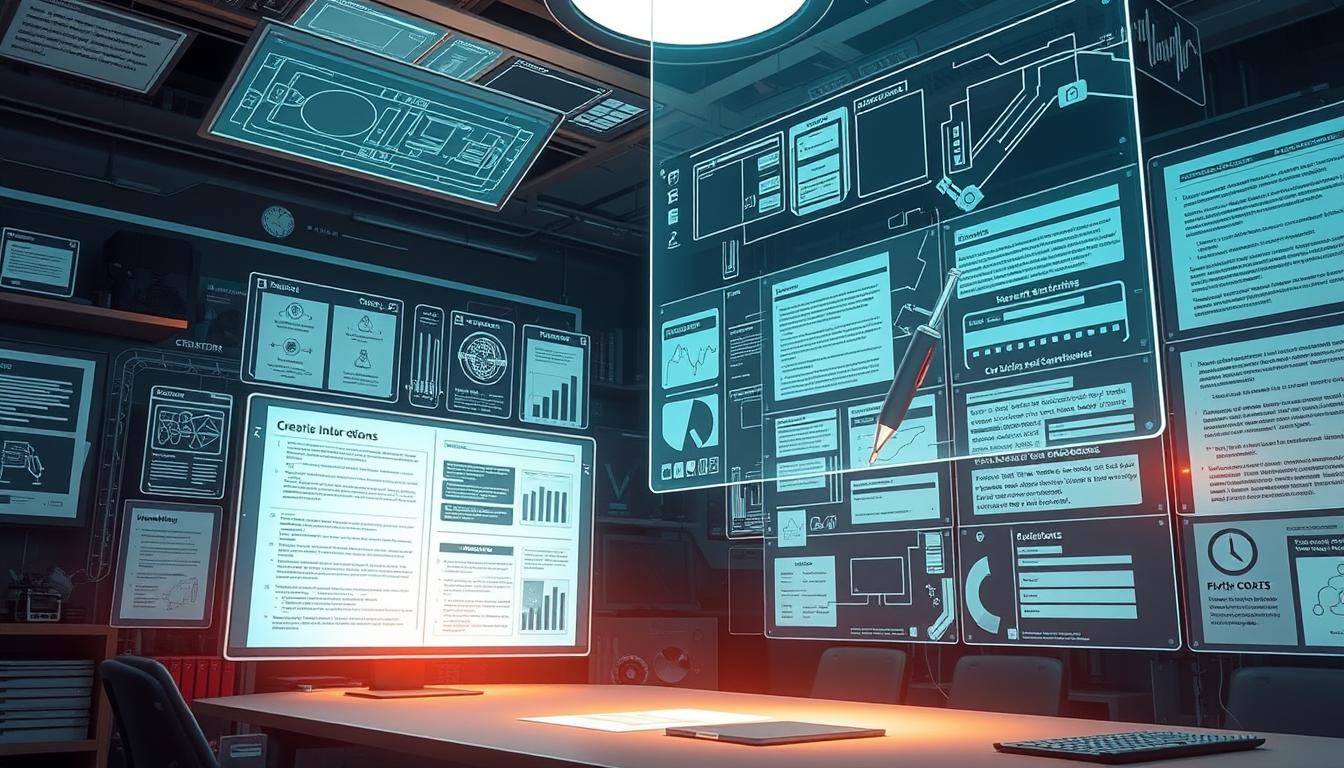
“AI-powered tools have profoundly impacted the way I approach screenwriting. They’ve not only accelerated my creative process but have also inspired me to explore new narrative directions that I may have never considered before.”
Enhancing Visual Effects with AI
AI has transformed visual effects in filmmaking. It powers CGI, 3D modeling, compositing, and post-production. This tech-creativity blend reshapes the cinematic landscape.
Seamless Integration of AI-Powered VFX
AI-driven effects create new possibilities for filmmakers. AI-enhanced CGI produces lifelike characters, environments, and objects. It pushes on-screen boundaries to new heights.
AI-generated 3D modeling speeds up design. It allows quick prototyping and refinement. The result? More engaging and immersive visuals.
AI-assisted compositing is a game-changer. It blends digital elements with live-action footage seamlessly. The outcome is a unified, compelling final product.
AI-powered VFX automates tedious tasks. This frees creative teams to focus on artistic aspects. It’s a major boost to the filmmaking process.
| AI-Driven Visual Effects | Advantages |
|---|---|
| AI-Enhanced CGI | Photorealistic characters, environments, and objects |
| AI-Generated 3D Modeling | Streamlined design process, rapid prototyping, and iterative refinement |
| AI-Assisted Compositing | Seamless blending of digital elements with live-action footage |
| AI-Powered VFX | Automation of tedious tasks, freeing up creative teams |
“The integration of AI in visual effects has truly opened up a new frontier in filmmaking, allowing us to push the boundaries of what is visually possible.”
AI is shaping the future of visual effects. It’s redefining cinema with stunning CGI and seamless compositing. Each frame brings us closer to a new era of filmmaking.
AI-Driven Set Design and World-Building
The film industry is changing fast. AI-generated set design and AI-powered world-building are reshaping how movies are made. These tools help create stunning on-screen worlds that amaze viewers.
AI in production design speeds up the creation of complex sets and landscapes. It allows filmmakers to test different ideas quickly. They can bring their visions to life with amazing detail and realism.
AI-assisted virtual environments have made set building easier. AI in set construction and props creates realistic 3D models. It helps make intricate set pieces and props faster.
| Feature | Benefit |
|---|---|
| AI-generated set design | Rapid conceptualization and visualization of immersive environments |
| AI-powered world-building | Creation of cohesive and captivating on-screen worlds |
| AI in production design | Streamlined set construction and prop-making process |
| AI-assisted virtual environments | Efficient experimentation and iteration of design concepts |
| AI in set construction and props | Automated fabrication of intricate set pieces and accessories |
AI is changing how movies are made. It’s creating more stunning worlds on screen. This tech is pushing the limits of storytelling in film.
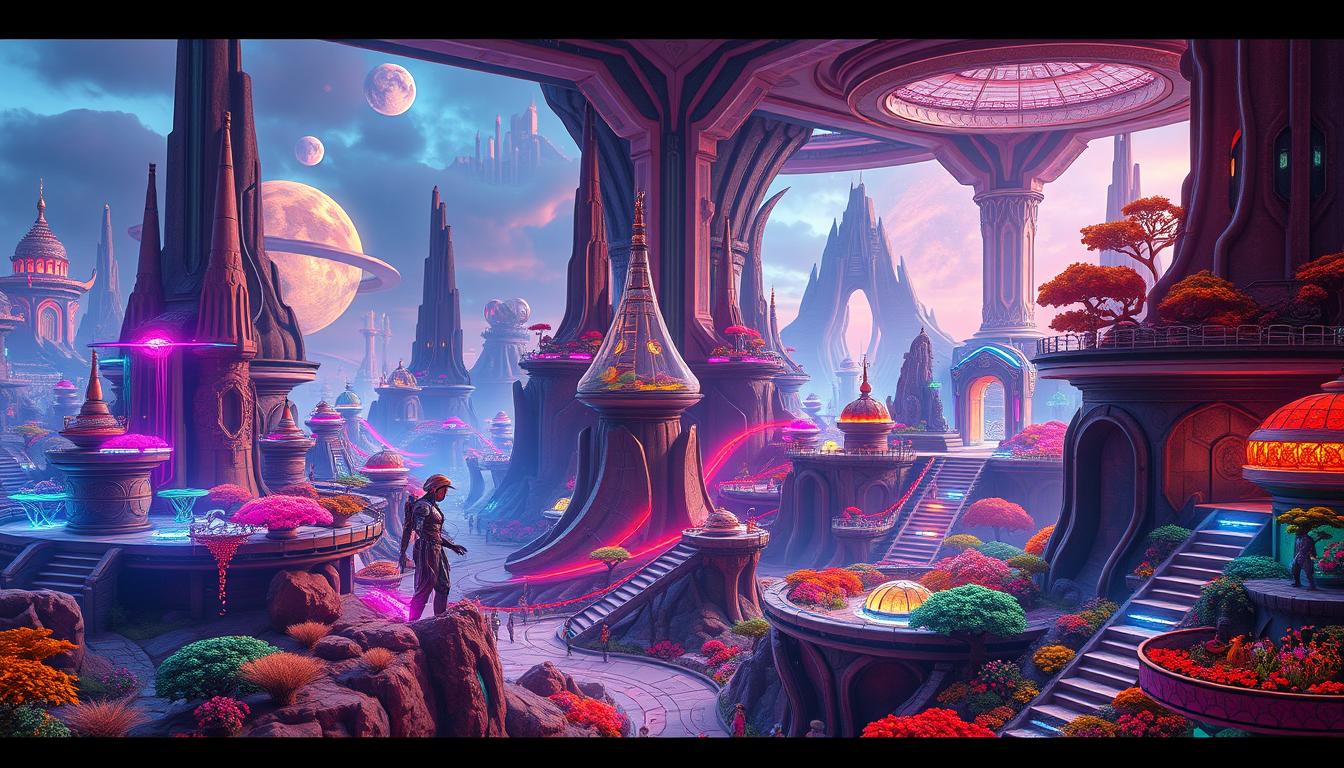
“AI-powered world-building has the potential to revolutionize the way we create and experience cinematic environments, opening up new realms of creative possibility.”
Collaborative Filmmaking with AI
Filmmaking is evolving with AI as a powerful creative partner. It’s transforming the industry and unlocking new levels of innovation. Filmmakers now use AI to boost their artistic expression.
Merging Human Creativity with AI Intelligence
AI-human collaboration in filmmaking has ushered in a new era. Filmmakers use AI-assisted filmmaking workflows to streamline their creative processes. This includes character development and visual effects.
By blending AI as a creative partner with their vision, filmmakers explore new frontiers. They’re pushing the boundaries of AI and human creativity in cinema.
- AI-driven character development: Harnessing AI to craft compelling narratives and bring characters to life in innovative ways.
- AI-assisted scriptwriting and storyboarding: Leveraging AI to enhance the storytelling process and visualize ideas more effectively.
- AI-powered visual effects: Integrating AI-driven technologies to seamlessly enhance cinematic visuals and bring new worlds to life.
This collaborative approach taps into AI’s vast potential. It helps filmmakers push their craft’s boundaries while keeping their unique voice. The future of filmmaking lies in blending human creativity with AI intelligence.
“The marriage of human creativity and AI intelligence is reshaping the way we approach filmmaking. It’s an exciting time to be a storyteller, as we unlock new possibilities for cinematic expression.”
| Collaboration Aspect | Benefits |
|---|---|
| AI-Driven Character Development | Enhance character depth, explore new narrative possibilities, and create more compelling characters. |
| AI-Assisted Scriptwriting and Storyboarding | Streamline the creative process, generate innovative ideas, and visualize concepts more effectively. |
| AI-Powered Visual Effects | Seamlessly integrate cutting-edge visual effects, create stunning new worlds, and push the boundaries of cinematic realism. |
Ethical Considerations in AI-Driven Filmmaking
AI is changing the film industry rapidly. We must address the ethical issues that come with this new technology. Responsible AI use in cinema requires fairness, transparency, and privacy protection.
AI systems can show biases that affect film narratives. Filmmakers need to spot and fix these biases. This ensures diverse viewpoints in AI-powered creations.
Responsible use of AI in cinema requires commitment to AI bias and fairness in filmmaking. Data collection in AI filmmaking raises privacy and data concerns.
Filmmakers should be open about data use and protection. AI transparency in the film industry builds trust and protects stakeholders’ rights.
The film industry must work together to tackle these issues. Filmmakers, tech experts, and ethicists should create guidelines for AI use.
Ethical implications of AI in filmmaking should lead discussions. This ensures responsible use of AI in cinema.
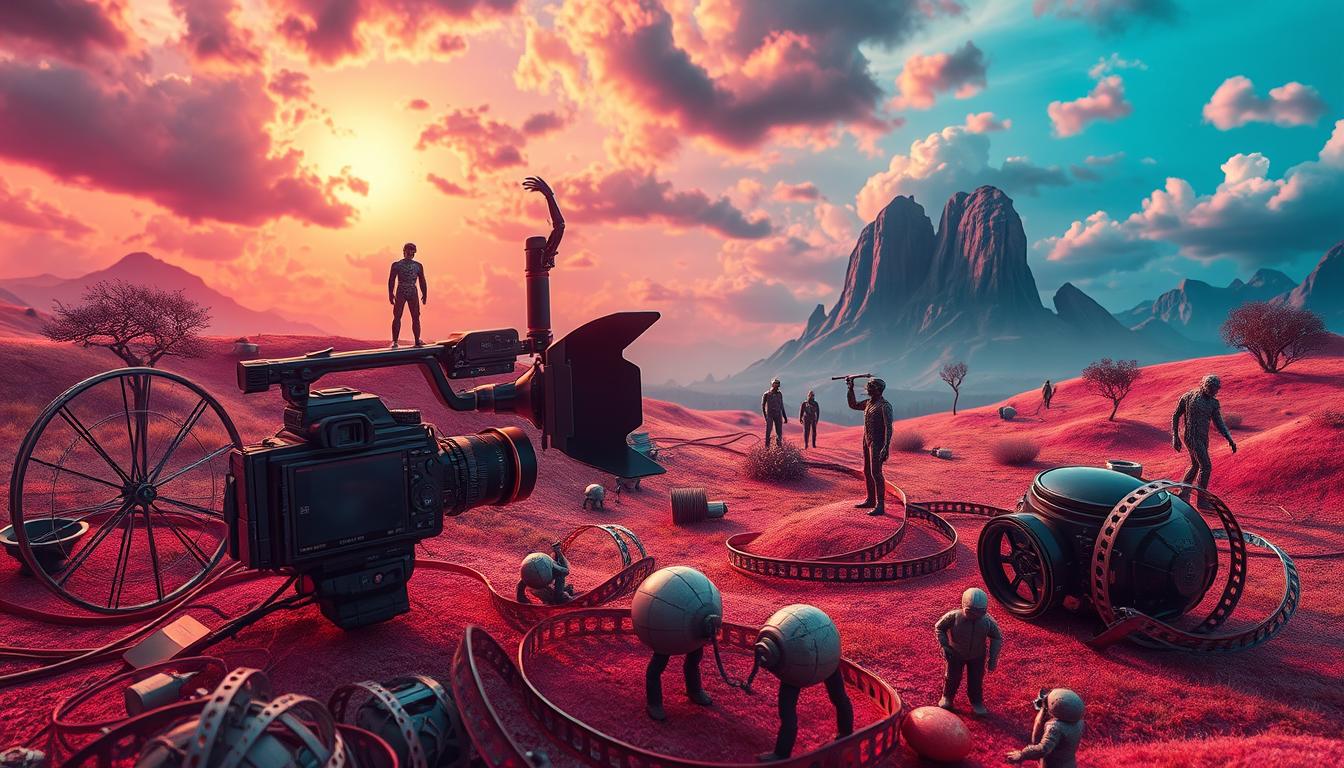
Ethical AI use allows the film industry to grow responsibly. It upholds creativity, fairness, and human dignity. Responsible AI will shape the future of filmmaking.
Case Studies: Successful AI-Driven Movies
AI is reshaping filmmaking, enhancing cinematic experiences worldwide. Let’s explore real-world examples of successful AI-driven movies. These cases showcase the transformative power of this technology.
Exploring Groundbreaking AI-Powered Films
Blade Runner 2049 is a prime example of AI-driven filmmaking. The film’s visual effects blend human and AI-generated elements seamlessly. AI-assisted set design and virtual cinematography created the film’s distinctive dystopian aesthetic.
1917 captivated audiences with its innovative single-shot illusion. AI-powered motion tracking and camera stabilization were crucial. These technologies allowed filmmakers to craft a seamless, real-time cinematic experience.
AI’s impact extends beyond visual effects and production design. Arrival showcased AI-driven storytelling potential. The film’s nonlinear narrative and unique linguistic approach were influenced by machine learning algorithms.
These cases prove AI’s successful implementation in cinema. They highlight its ability to push filmmaking boundaries. As AI-enhanced experiences evolve, the film industry’s future holds endless possibilities.
The Future of AI in the Film Industry
AI is set to revolutionize the film industry. It will change how movies are made, shared, and enjoyed. This technology opens up endless possibilities for storytelling in cinema.
AI tools will transform many parts of filmmaking. They’ll help with character creation, scriptwriting, and visual effects. Filmmakers will use AI to tell better stories and push creative boundaries.
AI advancements will shape future filmmaking trends. Natural language processing and computer vision will give filmmakers more control. These tools will help them bring their artistic visions to life more efficiently.
